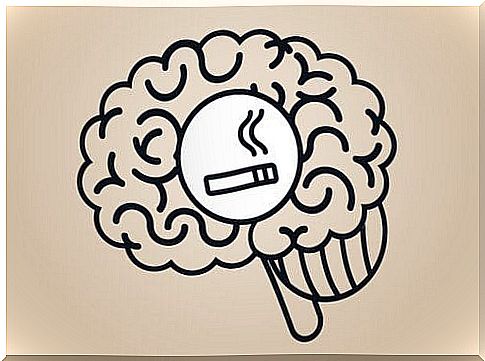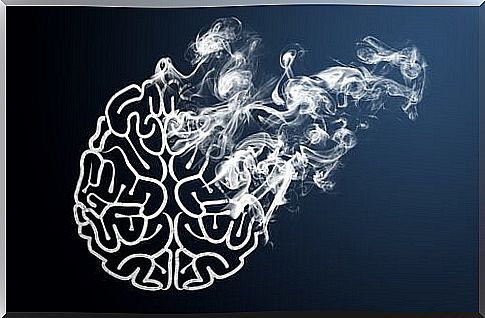What Is The Effect Of Nicotine On The Brain?

For a long time, many people ignored the fact that nicotine use can lead to addiction. However, scientists have discovered that this substance can lead to a dependence similar to that of hard drugs such as cocaine or amphetamines. In this article we therefore look at the effect of nicotine on the brain.
Nicotine can modify the brain. It causes changes in the reward system in the brain through complex mechanisms.
In other words, it creates a pleasurable sensation that the brain begins to depend on. This ensures that the body will ‘need’ the substance at some point.
Only the smoker can decide to stop smoking. Making the decision and going through the process are both difficult, but not impossible. The information in this article simply serves to illustrate the effect of nicotine on the brain, so that smokers are not taken by surprise.
The effect of nicotine on the brain
When a person consumes nicotine, a group of acetylcholine receptors in the brain are activated. These receptors cause the body to secrete dopamine. Dopamine is a neurotransmitter associated with feelings of motivation and pleasure. Basically, smoking causes a chemically induced sense of well-being.
The body quickly transports nicotine to the brain. It is estimated that it takes only 10 to 15 seconds for nicotine to travel from the lungs into the bloodstream. Studies show that every substance we smoke is potentially addictive, precisely because of how quickly the feeling of well-being is generated.
The brain has its own ‘nicotine’: acetylcholine. They also have their own marijuana, morphine, heroin etc. This means that the brain can mimic the effects of these substances without consuming them.
This happens when we have positive experiences, such as achieving a goal, laughing, or breaking a record. However, if we use chemicals to artificially activate the effects of dopamine, we run the risk of becoming addicted.

nicotine addiction
When you consume nicotine or another similar substance, the brain quickly reaches a state of well-being. If this occurs frequently, the brain becomes less and less able to generate pleasant sensations on its own that are not associated with the consumption of the substance.
In other words, it becomes harder to enjoy the same satisfaction naturally. At the same time, the brain relatively often begins to long for that state of well-being.
This can cause uncomfortable symptoms such as restlessness, nervousness and anxiety. As a result, the person will be inclined to consume the substance to counteract these symptoms.
This does not happen when the brain experiences pleasure naturally. In addition, the brain is conditioned over time. They begin to anticipate a sense of well-being, which leads to an uncontrollable smoking habit.
The harmful effects of smoking
Cigarette production is in the hands of large multinational companies. They have done everything within their power to study consumer behavior and promote addiction. Thus, they regulate the amount of nicotine in each cigarette so that the dependence is maintained.
They also make packs of 20 cigarettes because research has shown that a larger daily amount than that causes dissatisfaction. So everything is carefully planned.

Nicotine causes the brain to age faster. It reduces the brain’s ability to solve problems, make decisions, learn, and control impulses. This substance also weakens the orbitofrontal cortex of the brain. Finally, it also makes consumers more vulnerable to other addictions.
Quitting smoking is not easy, precisely because of everything we have explained above. To make it happen, a person needs a strong will and an effective strategy. It is best to quit smoking all at once, not gradually. At the same time, it can be helpful to create a system of motives and reinforcement.









